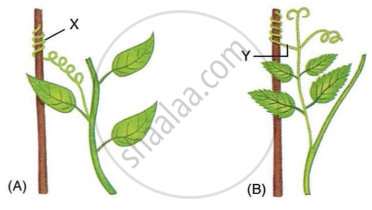Advertisements
Advertisements
प्रश्न
What is a tendril?
उत्तर
A tendril is a thin thread-like growth on the stems or leaves of a climbing plant.
APPEARS IN
संबंधित प्रश्न
Which of the following is a growth movement and which is not?
- Folding up of leaves of sensitive plant on touching with hand.
- Folding up of petals of dandelion flower when light fades.
The climbing organs of plants like tendrils grow towards any support which they happen to touch and wind around the support. This is an example of :
(a) chemotropism
(b) nastic movement
(c) thigmotropism
(d) geotropism
Which of the following plant part exhibits negative phototropism?
(a) root
(b) branch
(c) leaves
(d) stem
A potted plant having straight parts A and B was placed horizontally on its side as shown in Figure (i). After a few days, it was observed that parts A and B of the plant acquired new positions as shown in Figure (ii).
- Name the phenomenon exhibited by the position of plant parts A and B in Figure (ii).
- Name the stimulus (other than sunlight) which causes plant part A to grow and bend upwards, and plant part B to bend downwards.

Differentiate between:
Thigmotropism and geotropism
Name the stimulus which causes the following movements in plants.
phototropism, thigmotropism, hydrotropism and geotropism
The movement of sunflower in accordance with the path of sun is due to
What is a tropic movement? Explain with an example.
Name the stimulus which causes the following movement in plant:
Geotropism
Study the diagrams given below and answer the following questions:

- Name the structures shown as X and Y in the figures (A) and (B), respectively.
- Write the functions performed by the structures X and Y.
- Name the phenomenon depicted and define it.
- How do the structures X and Y differ from each other?
- Give examples of the plants which show the said phenomenon.
